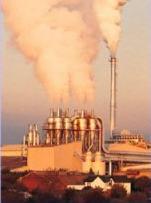Air pollution: Difference between revisions
imported>Robert Badgett No edit summary |
Pat Palmer (talk | contribs) mNo edit summary |
||
| (5 intermediate revisions by 5 users not shown) | |||
| Line 1: | Line 1: | ||
{{subpages}} | {{subpages}} | ||
{{Image|AirPollutionSource.jpg|right|160px|Coal-fired power plants are common sources of industrial air pollution.}} | |||
'''Air pollution''' is the "presence of contaminants or pollutant substances in the air (air pollutants) that interfere with human health or welfare, or produce other harmful environmental effects. The substances may include gases; particulate matter; or volatile organic chemicals" | '''Air pollution''' is the "presence of contaminants or pollutant substances in the air (air pollutants) that interfere with human health or welfare, or produce other harmful environmental effects. The substances may include gases; particulate matter; or volatile organic chemicals".<ref>{{MeSH}}</ref> | ||
<ref>{{MeSH}}</ref> | |||
==Health effects== | ==Health effects== | ||
An observational study in the [[United States]] found a "decrease of 10 µg per cubic meter in the [[Air pollutant concentrations|concentration]] of fine particulate matter was associated with an estimated increase in mean (±SE) life expectancy of 0.61±0.20 year."<ref name="pmid19164188">{{cite journal |author=Pope CA, Ezzati M, Dockery DW |title=Fine-particulate air pollution and life expectancy in the United States |journal=N. Engl. J. Med. |volume=360 |issue=4 |pages=376–86 |year=2009 |month=January |pmid=19164188 |doi=10.1056/NEJMsa0805646 |url=http://content.nejm.org/cgi/content/full/360/4/376 |issn=}}</ref> With the exception of [[exercise]] and [[smoking cessation]], the health benefit of reduction in pollution is estimated to be greater than most [[primary prevention]] efforts in health care such as [[infant vaccine]]s, [[mammography]] and [[Papanicolaou smear]]s.<ref name="pmid9691106">{{cite journal |author=Wright JC, Weinstein MC |title=Gains in life expectancy from medical interventions--standardizing data on outcomes |journal=N. Engl. J. Med. |volume=339 |issue=6 |pages=380–6 |year=1998 |month=August |pmid=9691106 |doi= |url=http://content.nejm.org/cgi/content/full/339/6/380 |issn=}}</ref> | An observational study in the [[United States of America]] found a "decrease of 10 µg per cubic meter in the [[Air pollutant concentrations|concentration]] of fine particulate matter was associated with an estimated increase in mean (±SE) life expectancy of 0.61±0.20 year."<ref name="pmid19164188">{{cite journal |author=Pope CA, Ezzati M, Dockery DW |title=Fine-particulate air pollution and life expectancy in the United States |journal=N. Engl. J. Med. |volume=360 |issue=4 |pages=376–86 |year=2009 |month=January |pmid=19164188 |doi=10.1056/NEJMsa0805646 |url=http://content.nejm.org/cgi/content/full/360/4/376 |issn=}}</ref> With the exception of [[exercise]] and [[smoking cessation]], the health benefit of reduction in pollution is estimated to be greater than most [[primary prevention]] efforts in health care such as [[infant vaccine]]s, [[mammography]] and [[Papanicolaou smear]]s.<ref name="pmid9691106">{{cite journal |author=Wright JC, Weinstein MC |title=Gains in life expectancy from medical interventions--standardizing data on outcomes |journal=N. Engl. J. Med. |volume=339 |issue=6 |pages=380–6 |year=1998 |month=August |pmid=9691106 |doi= |url=http://content.nejm.org/cgi/content/full/339/6/380 |issn=}}</ref> | ||
Increased levels of [[ozone]] may increase death from respiratory, but not cardiovascular causes.<ref name="pmid19279340">{{cite journal |author=Jerrett M, Burnett RT, Pope CA, ''et al'' |title=Long-term ozone exposure and mortality |journal=N. Engl. J. Med. |volume=360 |issue=11 |pages=1085–95 |year=2009 |month=March |pmid=19279340 |doi=10.1056/NEJMoa0803894 |url=http://content.nejm.org/cgi/pmidlookup?view=short&pmid=19279340&promo=ONFLNS19 |issn=}}</ref> | |||
==References== | ==References== | ||
<references/> | <small> | ||
<references> | |||
</references> | |||
</small> | |||
[[Category:Suggestion Bot Tag]] | |||
Latest revision as of 12:13, 27 July 2024
Air pollution is the "presence of contaminants or pollutant substances in the air (air pollutants) that interfere with human health or welfare, or produce other harmful environmental effects. The substances may include gases; particulate matter; or volatile organic chemicals".[1]
Health effects
An observational study in the United States of America found a "decrease of 10 µg per cubic meter in the concentration of fine particulate matter was associated with an estimated increase in mean (±SE) life expectancy of 0.61±0.20 year."[2] With the exception of exercise and smoking cessation, the health benefit of reduction in pollution is estimated to be greater than most primary prevention efforts in health care such as infant vaccines, mammography and Papanicolaou smears.[3]
Increased levels of ozone may increase death from respiratory, but not cardiovascular causes.[4]
References
- ↑ Anonymous (2025), Air pollution (English). Medical Subject Headings. U.S. National Library of Medicine.
- ↑ Pope CA, Ezzati M, Dockery DW (January 2009). "Fine-particulate air pollution and life expectancy in the United States". N. Engl. J. Med. 360 (4): 376–86. DOI:10.1056/NEJMsa0805646. PMID 19164188. Research Blogging.
- ↑ Wright JC, Weinstein MC (August 1998). "Gains in life expectancy from medical interventions--standardizing data on outcomes". N. Engl. J. Med. 339 (6): 380–6. PMID 9691106. [e]
- ↑ Jerrett M, Burnett RT, Pope CA, et al (March 2009). "Long-term ozone exposure and mortality". N. Engl. J. Med. 360 (11): 1085–95. DOI:10.1056/NEJMoa0803894. PMID 19279340. Research Blogging.
